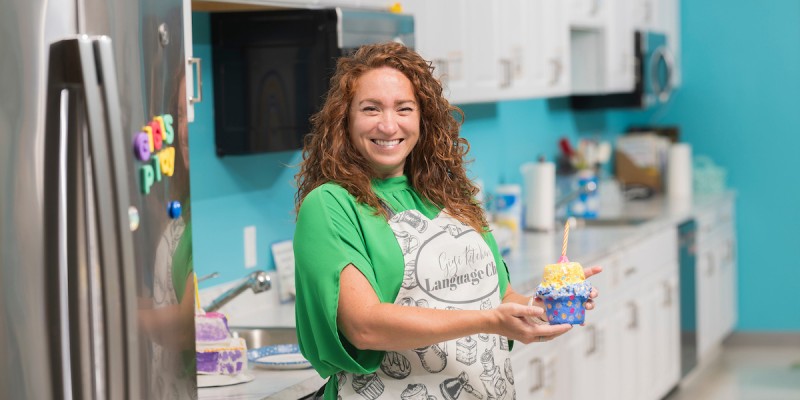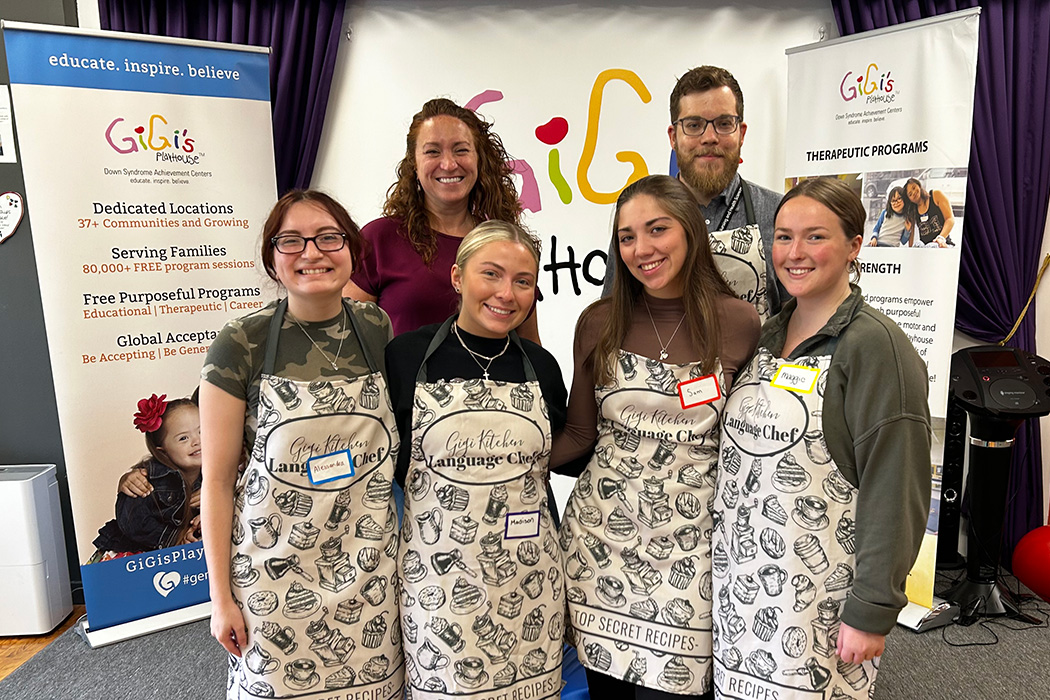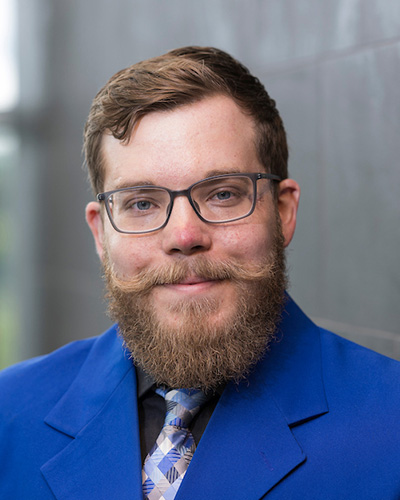Let’s eat! Binghamton program blends cooking with speech-language therapy to help adults with diverse learning needs
Decker College's Kara Nunn leads innovative program, GiGi’s Kitchen-Language Chef, to improve communication skills

Kara Nunn’s “aha moment” happened as she observed a cooking class for adults with diverse learning needs at GiGi’s Playhouse Southern Tier. As a speech and language pathologist for nearly two decades, Nunn recognized that the language demands and cognitive load of cooking and following a recipe prevented individuals from participating independently.
For Nunn, a clinical instructor in the Division of Speech and Language Pathology at Binghamton University’s Decker College of Nursing and Health Sciences, this was an opportunity to enhance language, articulation, comprehension and cognitive skills within a group setting. She proposed infusing speech-language therapy into the GiGi’s Kitchen program. By the fall 2023 semester, Nunn teamed with Assistant Professor Cody Dew and four undergraduate students in the division’s speech and hearing science minor.
GiGi’s Kitchen-Language Chef was born.
“The goal of our 12-week program is to improve participants’ foundational language skills, such as following directions, auditory comprehension, articulation, vocabulary usage, pragmatics and self-advocacy, which are crucial for independence but are often overlooked,” Nunn says.
Cooking, language and more
The pilot program, supported by Binghamton University Community Engagement Faculty Teaching and Research Enrichment grants, involved 13 participants with diverse learning needs, including Down syndrome, autism, cerebral palsy, limited verbal ability and intellectual disability. Each class also included the participants’ caregivers, Playhouse staff, nutritionists, Nunn, Dew and the students.
The team collaborated with two volunteer nutritionists at GiGi’s to develop healthy recipes. They simplified each recipe into 10 or fewer steps and created a picture cue for each. Participants received a bag containing all the pictures at the start of the 90-minute cooking class. Following Nunn’s model, they sequenced and matched the pictures, creating a visual schedule on a 10-square grid in front of them.
“This method supported independence by providing a clear, visual sequence for each task, reducing the cognitive load of the auditory instructions,” Nunn explains.
Initially, participants needed a lot of support, but by the end of the program, most could complete tasks independently. And they didn’t just learn cooking skills. Nunn says many participants connected with their peers, offering assistance to each other and initiating conversation. Participants practiced social skills during family-style meals, enjoying the food they just cooked. This was particularly important for those struggling to be task-oriented at mealtime.
“We worked on skills such as making eye contact, asking questions and pacing eating to create a more typical mealtime experience,” Nunn says. “The fact that they were involved in creating the meals motivated them to try new foods and textures.”
Research and outcomes
Language Chef was conducted as a pilot research project exploring the possible benefits of a group-based language intervention embedded in a life-skills program: Could this intervention improve the language abilities of adults with diverse learning needs?
“The research focused on measuring the improvement of language goals,” Dew says. “We took a qualitative approach, looking at the program’s overall impact.”
To collect participant feedback, the researchers used an adapted Likert scale that included pictures of faces expressing different emotions, similar to the smiley face scales commonly used in healthcare. Caregivers were asked open-ended questions about the changes they observed in the participants.
The results show improvement in participants’ expressive and receptive language, social language and self-correction skills. Participants also exhibited increased independence, improved pride and self-confidence, and expanded interests. Finally, participants enjoyed the program and built friendships with peers and the student assistants.
“My participant is now expressing more of what he wants and wants to do in the community; before, we would struggle with that,” one caregiver wrote. Another noted: “This is definitely his favorite part of the week. He continually shares everything he’s been doing with everyone we come in contact with all week long.”
“We aimed for meaningful growth in language goals, specifically in expressive, receptive and social language,” Dew says. “Although we didn’t initially consider self-correction, we noticed participants learning to make improvements on their own.”
Moving forward
Leaders at GiGi’s Playhouse are pleased with the program: “[Merging] the therapeutic element of speech and language into a program that we were already running is incredible,” says Katherine Whaley, site manager for GiGi’s Playhouse Southern Tier. “Having the opportunity to work closely with Binghamton University with this collaboration of GiGi’s Kitchen-Language Chef has impacted the Playhouse greatly.”
Nunn presented the project at GiGi’s Playhouse Incorporated’s national convention in 2023, and as a result, GiGi’s is seeking grant funding to expand Language Chef nationwide. She also presented at the New York State Speech Language and Hearing Association Conference in May 2024, and she and Dew are collaborating on a research paper.
According to Nunn, the research group will return to GiGi’s Playhouse in spring 2025: “We hope to expand, grow and make some improvements to our research and methods at that time.” Those changes will likely include adding graduate students from the division’s new Master of Science in Speech-Language Pathology program to the team.
“We hope to offer this placement to graduate students every spring semester who will be responsible for running the program and will be able to earn clinical hours and gain experience working with this population,” Dew says. “My focus will be on continuing to be involved in the research aspect. I foresee the research continuing indefinitely.”


